How Diet Can Affect Autism Symptoms
Emerging Insights into Dietary Strategies for Autism Management

Understanding the Impact of Nutrition on Autism
Recent research highlights the pivotal role that diet and nutrition play in influencing autism symptoms and overall health. Although autism is primarily a neurodevelopmental condition, factors like gastrointestinal health, nutritional deficiencies, and sensory sensitivities significantly impact behavioral and cognitive outcomes. This article explores the complex interactions between diet and autism, offering evidence-based strategies, the role of healthcare professionals, and insights into how personalized nutrition can improve quality of life for individuals with autism spectrum disorder (ASD).
The Influence of Dietary Patterns on Autism Symptoms
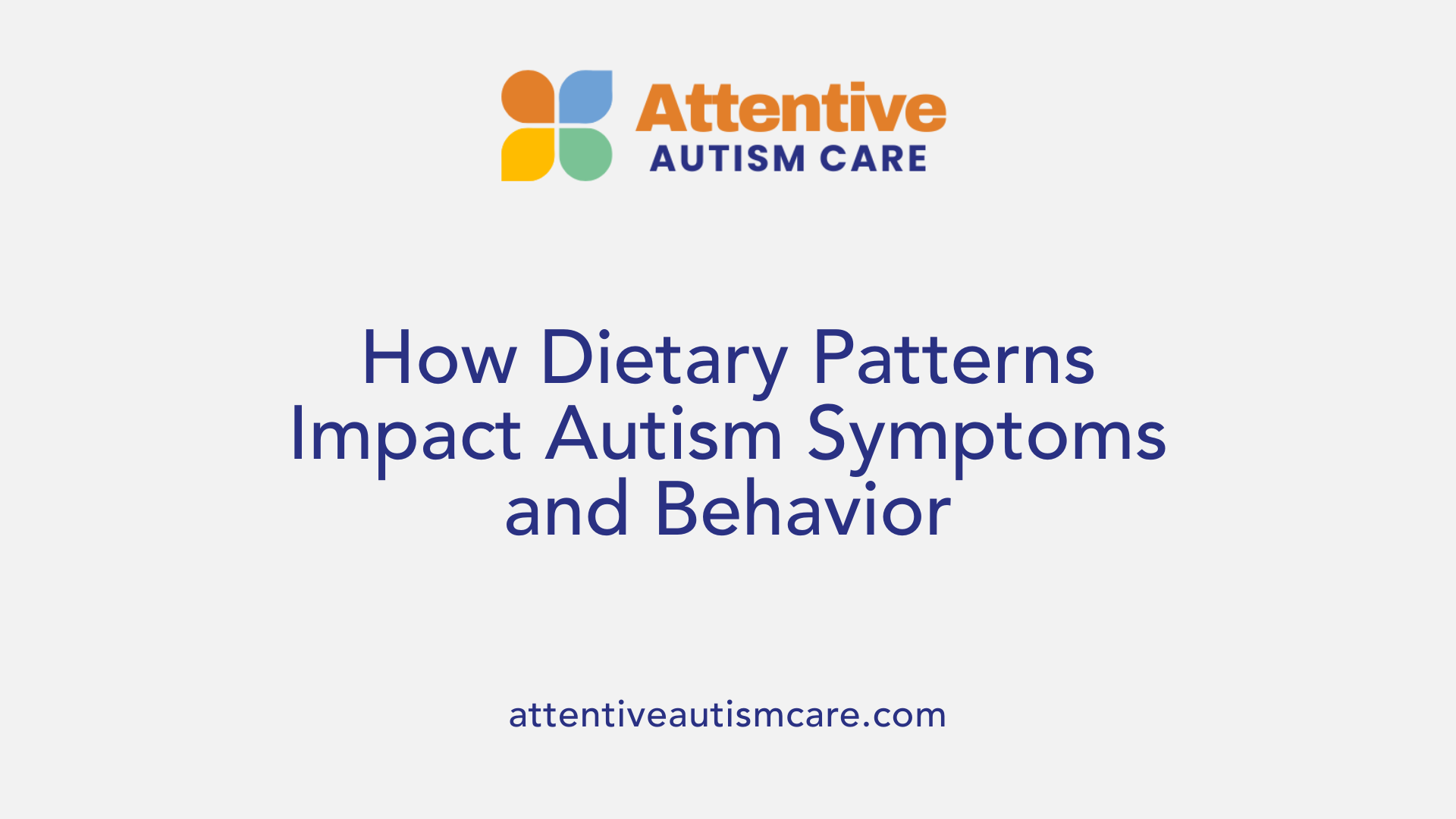
How does diet influence autism symptoms?
Dietary interventions can play a significant role in managing autism symptoms by focusing on improving gastrointestinal health, reducing oxidative stress, and modulating the gut-brain axis. Many children with autism experience food selectivity, often preferring energy-dense but nutrient-poor foods, which can lead to nutritional deficiencies affecting behavior and health.
Research suggests that diets like the gluten-free and casein-free (GFCF) diet, ketogenic diet, and probiotic-rich diets have shown promising results. These diets aim to reduce gut inflammation, improve digestion, and influence brain chemistry, potentially leading to behavioral, cognitive, and social improvements.
For example, some children adhering to the GFCF diet report reduced hyperactivity, tantrums, and improved social interactions. Similarly, ketogenic diets, which are low in carbohydrates and high in fats, have demonstrated behavioral and cognitive benefits in controlled studies.
Probiotics and microbiota transplants are also explored as safe interventions to restore gut microbiota balance. Improvements in gastrointestinal issues such as constipation and diarrhea often accompany these approaches, which may indirectly benefit behavior.
While empirical evidence varies, participants generally report fewer adverse effects with dietary strategies than with medications. Nonetheless, responses are highly individual, and the effectiveness of diet-based interventions depends on proper implementation and professional guidance.
How does diet influence autism symptoms? (continued)
The mechanisms behind dietary influence include reducing peptides that cross the blood-brain barrier, which may impact neurotransmission and brain function. Reducing processed foods and sugars helps stabilize blood sugar levels, reducing mood swings and irritability. Supplements like omega-3 fatty acids from fish or plant sources, along with vitamins such as vitamin B6, vitamin C, vitamin D, magnesium, and zinc, support brain health and reduce hyperactivity.
While no single diet cures autism, many approaches show potential to improve specific symptoms and quality of life. Ongoing research continues to explore personalized diets tailored to individual needs, sensitivities, and responses.
Comparing personalized diets and standard treatments
Standard treatments for autism primarily encompass behavioral therapies and medications aimed at managing specific symptoms. Dietary interventions, in contrast, are often used as supplementary strategies to improve overall well-being.
Personalized diets are designed based on individual preferences, sensitivities, and medical conditions. These diets, such as gluten-free, casein-free, Specific Carbohydrate Diet (SCD), Paleo diet, and yeast-free diet, are chosen to address specific issues like gut health or food allergies.
While standard treatments typically focus on behavioral and developmental interventions, dietary strategies directly target underlying physiological and metabolic factors. This personalized approach requires collaboration with healthcare providers, especially dietitians, to ensure nutritional adequacy.
Comparative studies indicate that dietary interventions may not replace standard therapies but can enhance their effectiveness and improve behavioral and gastrointestinal outcomes. Nevertheless, the scientific community emphasizes the importance of rigorous research to substantiate these approaches and to develop guidelines for their safe implementation.
| Aspect | Standard Treatments | Dietary Interventions | Additional Insights |
|---|---|---|---|
| Focus | Behavioral therapy, medications | Gut health, nutrition, metabolism | Often used together for best results |
| Personalization | Generally standardized | Tailored to individual sensitivities | Requires professional guidance |
| Evidence | Extensive for behavioral management | Growing but limited | Promising for certain individuals |
| Risks | Side effects, dependency | Nutritional deficiencies, compliance issues | Nutritional expert involvement essential |
By combining these strategies, many families find a comprehensive approach that addresses the diverse needs of children with autism, optimizing both neurological and physical health.
Current Scientific Evidence on Diet-Autism Connection
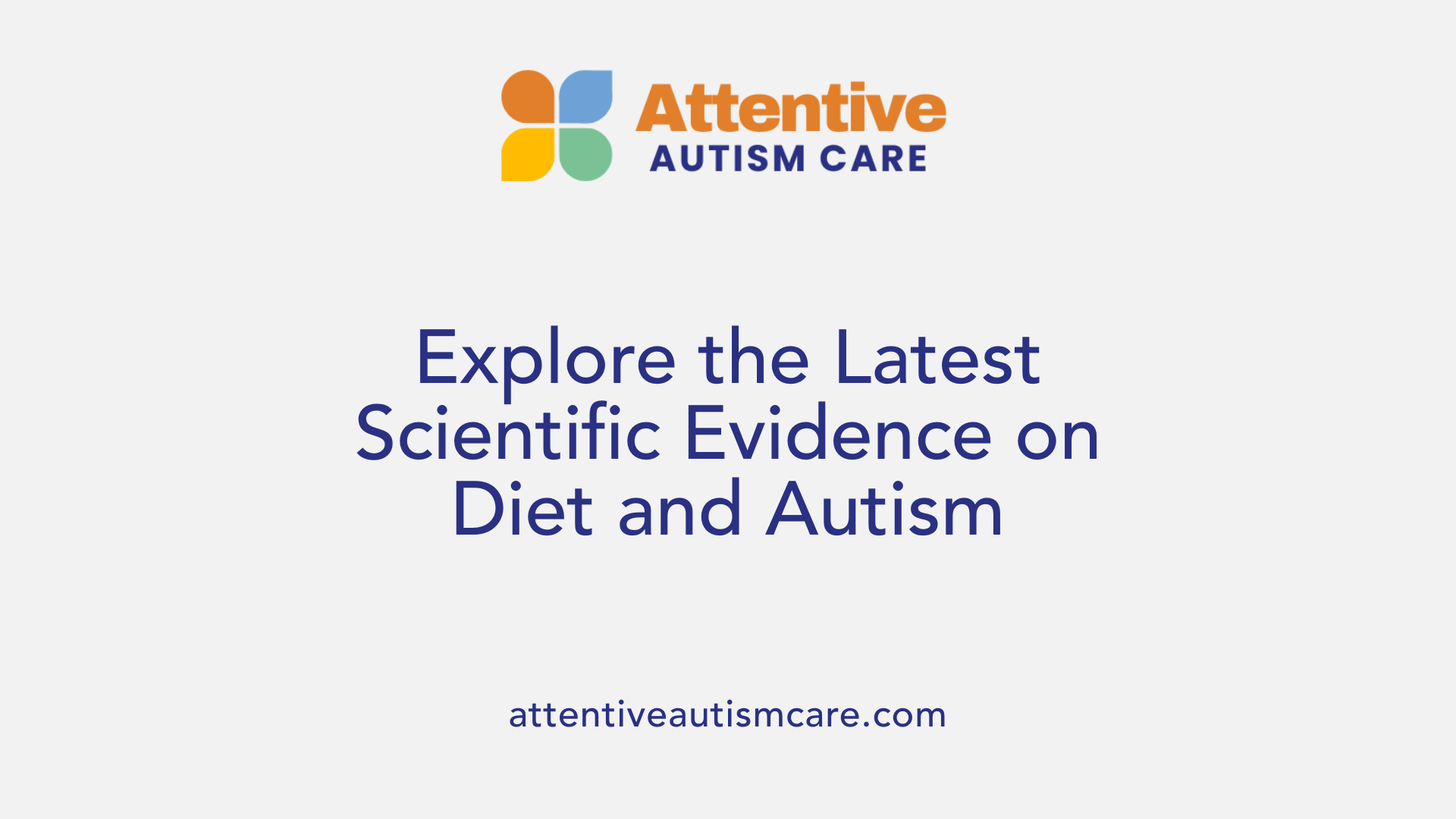
What is the current scientific research on the connection between diet and autism?
Research indicates that children with autism spectrum disorder (ASD) often experience extreme food selectivity, which can significantly impact their nutritional intake. Many children with ASD tend to prefer energy-dense, nutrient-poor foods and have limited variety, frequently avoiding fruits, vegetables, and other healthy options.
This selective eating behavior often leads to deficiencies in essential nutrients such as calcium, vitamin D, B12, vitamin C, zinc, and proteins. These deficiencies can contribute to various health issues and may even influence behavioral and cognitive development.
Several dietary interventions have been explored to help manage ASD symptoms. The gluten-free and casein-free (GFCF) diets are among the most popular, with some parents reporting improvements in behaviors like irritability and hyperactivity. Although these diets are widely used, current scientific evidence does not definitively support their efficacy for autism; studies remain limited and conflicting.
Other diets, such as the Feingold diet, paleo diet, and the Specific Carbohydrate Diet (SCD), are also tried by families seeking symptom relief. However, robust scientific validation is still lacking for many of these approaches.
Recent clinical trials have shown promise in certain supplements and dietary components. Vitamin D3 supplementation has been associated with improvements in some behavioral aspects, potentially due to its role in brain development and immune regulation. Similarly, sulforaphane, a compound found in broccoli sprouts, has demonstrated benefits related to social behavior and irritability in some children with ASD.
Emerging research also highlights the importance of gut microbiota health. Modulating gut bacteria through probiotics and microbiota transplants shows potential in reducing gastrointestinal problems and behavioral disturbances.
Overall, the scientific community recognizes the relevance of diet in autism management but emphasizes the need for more rigorous, large-scale studies. Currently, personalized nutritional plans, guided by healthcare professionals, remain the best approach to address individual needs.
| Dietary Strategy | Current Evidence | Limitations | Additional Notes |
|---|---|---|---|
| Gluten-Free/Casein-Free Diet | Some reports of symptom improvements, but evidence not conclusive | Limited large RCTs; potential nutritional risks | Should be supervised by a healthcare professional |
| Supplementation (Vitamin D3, Sulforaphane) | Clinical trials show some behavioral improvements | Small sample sizes; need for long-term safety data | Promising, but more research needed |
| Gut Microbiota Modulation | Emerging evidence supports gastrointestinal and behavioral benefits | Still experimental; optimal protocols unclear | Can be combined with dietary modifications |
| Ketogenic and Carbohydrate-Restricted Diets | Show behavioral/cognitive benefits in some studies | Strict adherence required; nutritional risks if not monitored | Typically used under medical supervision |
In conclusion, diet plays a significant role in managing certain symptoms of ASD. While some interventions show initial promise, the evidence is not yet definitive. Personalized care, based on ongoing research and under medical guidance, remains essential for optimizing health outcomes in children with autism.
Nutritional Strategies and Interventions in Autism Management
What nutritional interventions are used to manage autism?
Managing autism through nutrition involves a variety of strategies aimed at improving gastrointestinal symptoms and behavioral issues. Due to the common occurrence of food selectivity, sensitivities, and gut health problems among children with ASD, dietary interventions are often considered.
One of the most explored options is the implementation of specialized diets. These include the gluten-free and casein-free (GFCF) diet, which removes wheat and milk proteins believed by some to affect autism symptoms. Other diets like the ketogenic diet, which is carbohydrate-restricted and high in fats, and the Specific Carbohydrate Diet (SCD), are also used to potentially boost cognitive and behavioral outcomes. These diets are selected mainly for their reported benefits, though scientific evidence supporting their efficacy varies.
In addition to dietary changes, supplementation with vitamins and minerals forms a cornerstone of nutritional management. Vitamins such as B6, B12, and folate are often used to support metabolic and neurological functions. Essential fatty acids, particularly omega-3s like EPA and DHA found in fish oil, have been associated with improvements in hyperactivity, attention, and social interaction. Minerals such as magnesium and zinc are also utilized to support brain health and reduce irritability.
Beyond diet and supplementation, probiotics, microbiota transplants, and digestive enzymes are gaining attention. These interventions aim to restore gut flora balance, reduce gastrointestinal discomfort, and potentially improve behavior. Probiotics help in populating the gut with beneficial bacteria, potentially alleviating issues like constipation and diarrhea. Microbiota transplants are a newer, emerging approach that focuses on restoring a healthy microbial community in the gut.
While these nutritional strategies show promise, there is currently no one-size-fits-all solution. The evidence for their effectiveness remains mixed, emphasizing the importance of professional supervision. Healthcare providers, especially dietitians, are essential in designing safe and balanced nutrition plans tailored to each child's specific needs. Ongoing research and personalized approaches are crucial to refining these interventions and understanding their full benefits.
Important note: Before starting any restrictive diet or supplement regimen, consulting with a healthcare professional ensures nutritional adequacy and monitors possible side effects. This approach helps maximize potential benefits while minimizing risks, supporting better health and development in children with autism.
How Dietary Choices Affect Autism-Related Behaviors and Health
How do dietary choices affect autism-related behaviors and health?
Diet plays an influential role in the health and behaviors of children with autism spectrum disorder (ASD). Research indicates that certain dietary interventions, such as the gluten-free and casein-free (GFCF) diet and ketogenic diet, may have positive effects on behavior and cognitive functions in some children. These diets are thought to work by altering gene expression, neurotransmitter activity, and the gut-brain axis, thus potentially reducing symptoms like irritability, hyperactivity, and gastrointestinal (GI) issues.
Many parents report noticeable improvements when eliminating gluten (a wheat protein) and casein (a milk protein) from their child's diet, especially in reducing autism symptoms. However, these diets pose nutritional challenges, as they can limit food variety and increase the risk of deficiencies in vital nutrients. Children with ASD often consume a narrow range of foods, favoring energy-dense but nutrient-poor options. This selective eating can lead to deficiencies in calcium, protein, vitamins D and B12, zinc, and other essential nutrients.
Nutritional shortages not only compromise physical health but can also influence behavior. For example, low levels of vitamin D and zinc are associated with worsened behavioral outcomes and increased irritability. Supplementing with specific vitamins, such as vitamin D3, or minerals like zinc, has shown promise in improving metabolic functions, reducing hyperactivity, and aiding language development.
Gut health is a central aspect of this discussion. Many children with ASD experience GI problems like constipation, diarrhea, and discomfort, which are linked to behavioral issues such as increased irritability and anxiety. Restoring a healthy gut microbiome through probiotics, prebiotics, and fermented foods can improve digestion and, consequently, behavior.
Further, research suggests that omega-3 fatty acids, found in fish and certain plant sources, support brain health, potentially reducing impulsivity and hyperactivity. Other nutrients like magnesium and vitamin B6 are also thought to foster better cognitive and behavioral outcomes.
While some dietary approaches show promise, current scientific evidence does not conclusively support the widespread use of restrictive diets as a cure for autism. Nevertheless, targeted supplementation—like vitamin D3 and sulforaphane (found in broccoli sprouts)—may offer therapeutic benefits based on ongoing clinical trials.
In summary, dietary choices—focused on balanced, nutrient-rich foods—can influence behavioral and physical health in children with ASD. Addressing nutritional deficiencies, supporting gut health, and managing food sensitivities are vital components of comprehensive care, which should be guided by healthcare professionals. A mindful, individualized approach to diet can enhance quality of life, promote well-being, and possibly ease some autism-related challenges.
Gut-Brain Connection and Dietary Influence in Autism
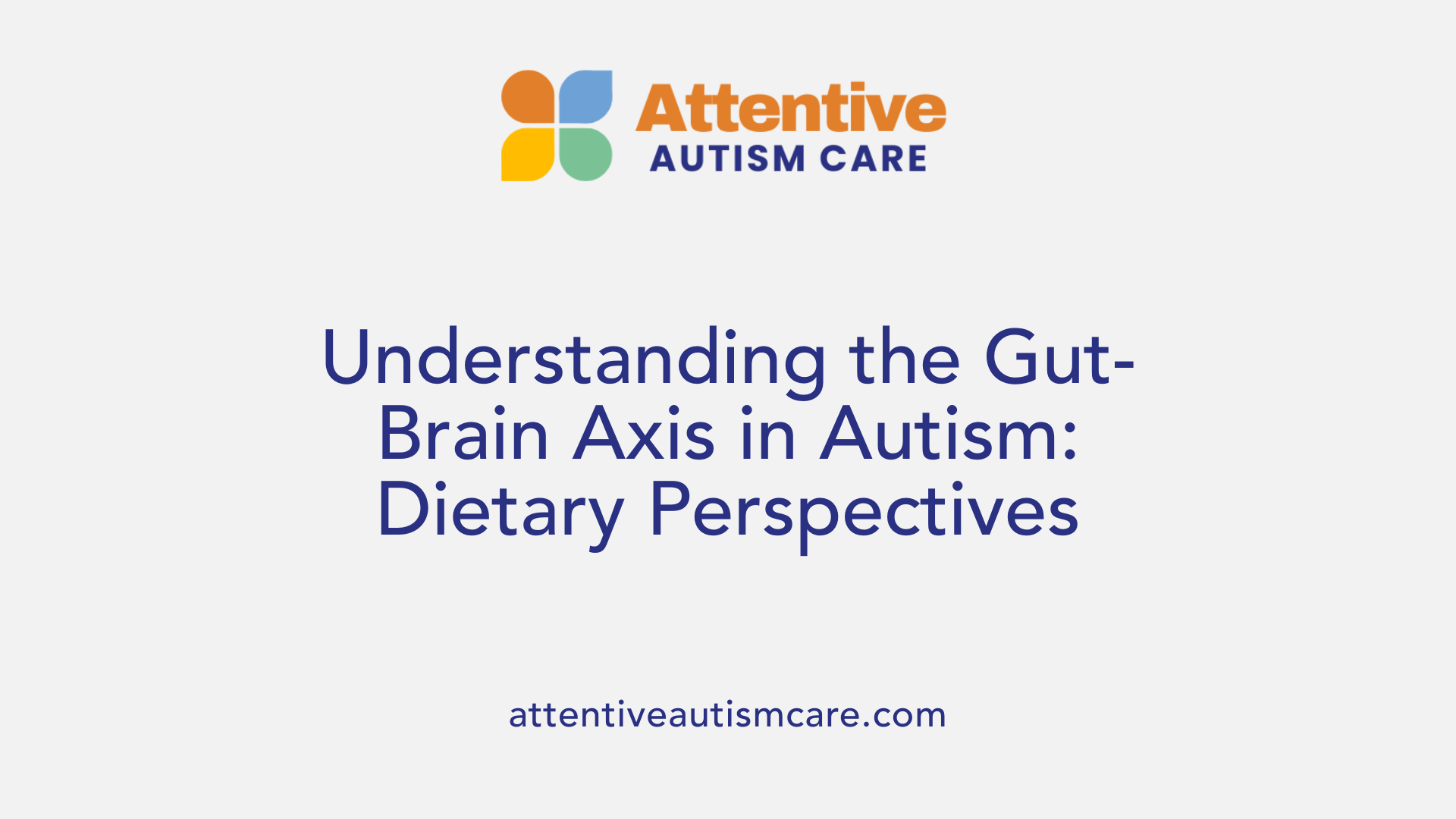
How does gut health influence autism symptoms?
Recent studies suggest a significant link between gut health and autism spectrum disorder (ASD) symptoms. This connection is primarily mediated through the microbiota–gut–brain axis, a complex communication network where gut bacteria influence neurological functions, immune responses, and overall behavior.
During pregnancy, elevated levels of inflammatory cytokines such as interleukin-17a (IL-17a) can interfere with normal fetal brain development. Maternal immune activation and gut inflammation are believed to increase the risk of autism-like behaviors in offspring. These immune and inflammatory pathways can alter brain development, contributing to symptoms observed in children with ASD.
The composition of gut microbiota — the community of bacteria residing in the digestive system — is affected by various factors including delivery method at birth (cesarean or vaginal), antibiotic use, and dietary habits. This microbial community influences the production of neuroactive substances like serotonin, a neurotransmitter vital for mood and cognition, and short-chain fatty acids, which support gut barrier function and immune regulation.
Disruptions in this microbial balance may increase gut permeability ('leaky gut'), promote inflammation, and release neuroactive compounds that affect brain function and behavior. For example, an imbalance can lead to gastrointestinal issues such as constipation and diarrhea, which are common in children with ASD and can exacerbate behavioral challenges.
Emerging interventions aim to restore a healthy gut microbiome to alleviate ASD symptoms. These include probiotic supplementation, dietary modifications to foster beneficial bacteria, and fecal microbiota transplantation (FMT). Early evidence indicates that such approaches can improve gut health, potentially reducing irritability, hyperactivity, and other behavioral symptoms.
While promising, much of the research is still ongoing. The complexity of the microbiota–gut–brain axis means that individual responses vary, and definitive clinical protocols are yet to be established. The consensus emphasizes that maintaining gut health is a promising avenue for supporting children with autism, but further studies are required to understand mechanisms and optimize interventions.
In conclusion, the link between gut health and autism underscores the importance of a holistic approach to managing ASD. By promoting a balanced microbiome through diet, probiotics, and other therapies, it may be possible to positively influence behavioral and neurological outcomes. Continued research will help clarify these relationships and pave the way for targeted treatments tailored to individual microbiota profiles.
Sensory Sensitivities, Dietary Restrictions, and Autism
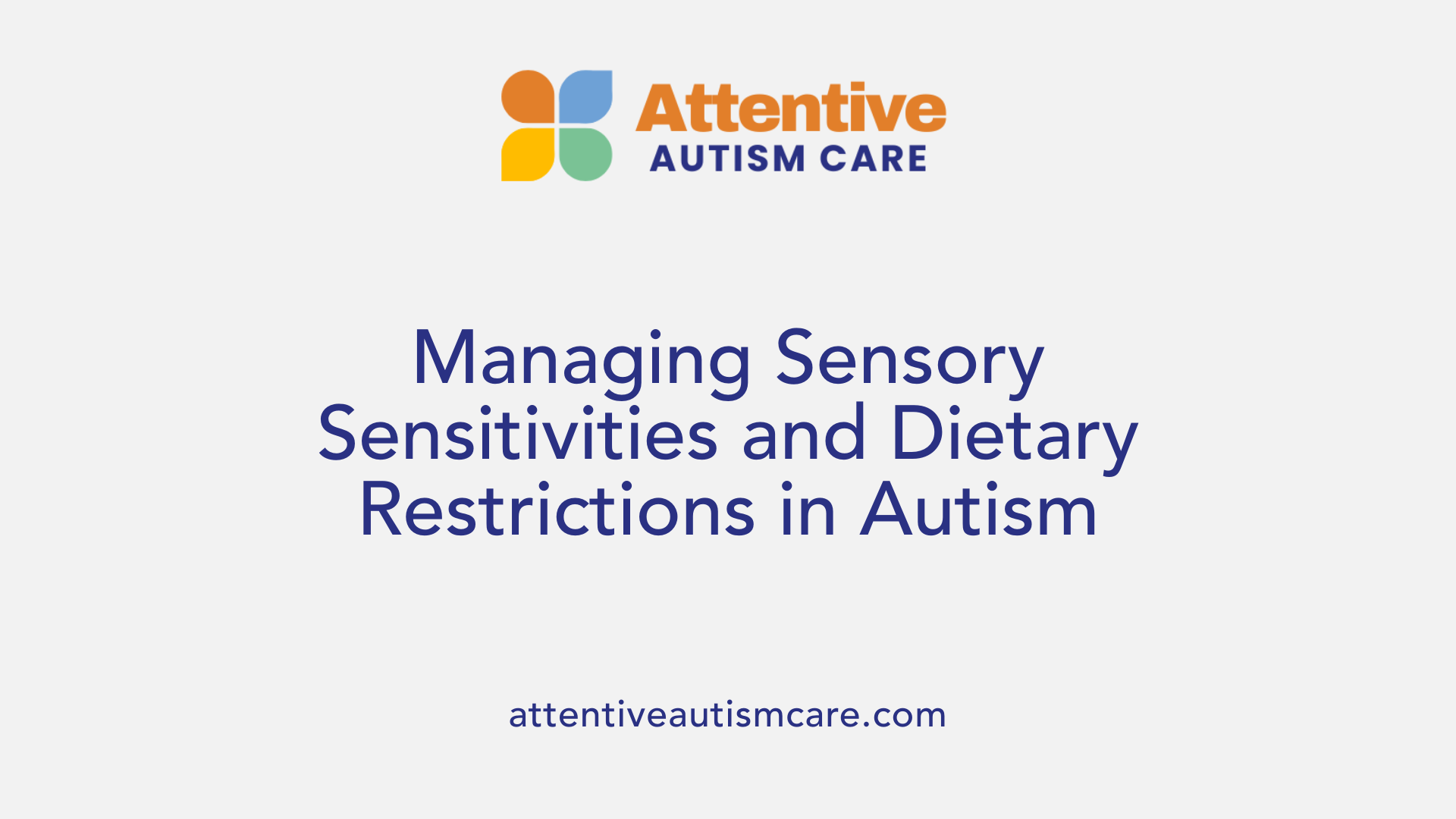
How do dietary restrictions and sensory issues affect individuals with autism?
Children with autism often face unique challenges related to their sensory sensitivities, which can heavily influence their eating behaviors. Many individuals with ASD experience heightened sensitivities to textures, smells, tastes, and visual aspects of food. This over-responsiveness means that certain foods—especially those with strong odors, unusual textures, or vibrant colors—can trigger discomfort or even aversion.
As a consequence, children with autism frequently develop very limited diets, primarily consuming a narrow range of familiar, easy-to-eat foods. This food selectivity may lead to nutritional deficiencies, especially in vital vitamins and minerals such as calcium, vitamin D, zinc, and B vitamins. Poor nutrition can exacerbate behavioral and health issues, making management more complex.
Parents and caregivers often notice that sensory sensitivities contribute to disruptive mealtime behaviors, including tantrums or ritualistic eating patterns. These behaviors are not only challenging but can also limit dietary variety, increasing the risk of health-related problems like constipation, dietary gaps, and poor growth.
Common dietary restrictions and their nutritional implications.
Many families explore specific restrictive diets in hopes of improving autism symptoms. Popular options include gluten-free and casein-free diets, where proteins found in wheat and milk are eliminated. While some parents report improvements in behavior and medical issues, scientific evidence remains inconclusive.
Such diets, if not carefully managed, can pose nutritional risks by reducing intake of essential nutrients. For example, eliminating dairy can lead to deficiencies in calcium and vitamin D, critical for bone health. Excluding grains might decrease fiber intake, impacting gut health.
Other restrictive diets like the Paleo diet, Specific Carbohydrate Diet, and yeast-free diet are also used by some, though their benefits and safety need further research. It’s crucial that these diets are supervised by health professionals to ensure balanced nutrition.
Strategies to mitigate sensory-related eating challenges.
Addressing sensory sensitivities involves a multifaceted approach. Gradual desensitization techniques can help children become more comfortable with different textures and smells. For instance, slowly integrating new foods alongside familiar ones can ease anxiety and expand dietary options.
Involving children in food preparation and choice, using visual supports, and creating predictable mealtime routines can reduce anxiety. Food texture modifications—such as pureed, chopped, or soft foods—can make eating less overwhelming.
Additionally, working with dietitians experienced in autism can help design balanced meal plans that respect sensory preferences while avoiding nutritional deficiencies. Introducing supplements when necessary, like vitamin D or omega-3 fatty acids, can also support overall health.
Understanding the intricate relationship between sensory sensitivities and dietary behaviors is essential to improve nutrition and quality of life for individuals with autism. Tailored interventions that respect sensory preferences yet promote nutritional balance can lead to better health outcomes and more pleasant mealtime experiences.
The Role of Dietitians and Professional Guidance in Autism Nutrition
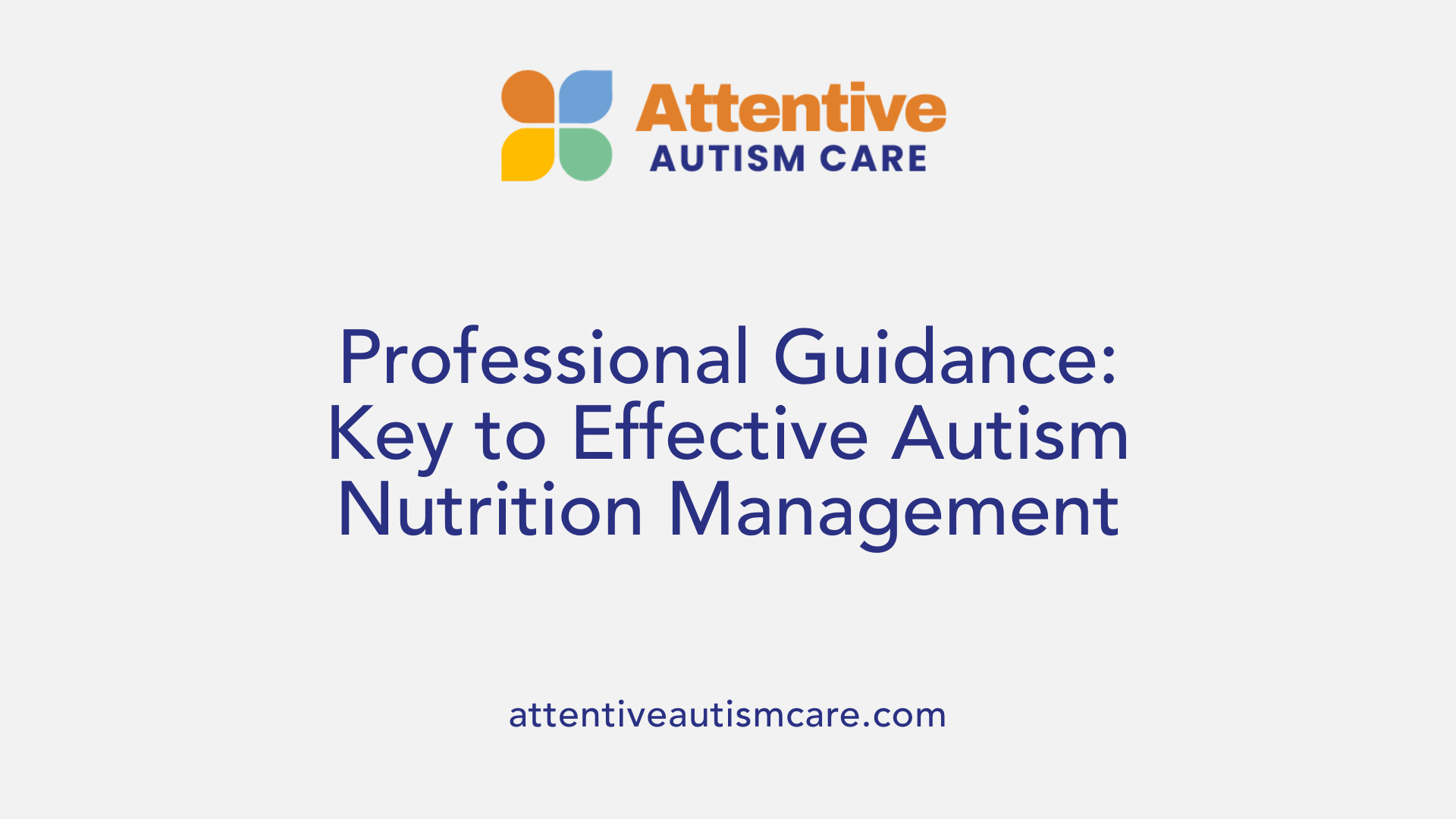
What is the role of dietitians in managing nutrition for individuals with autism?
Dietitians are essential in supporting the nutritional well-being of children and adults with autism. They start by thoroughly assessing each individual’s dietary patterns, nutritional deficiencies, and sensory sensitivities that influence eating behavior. This assessment helps identify gaps in essential nutrients like calcium, vitamin D, B vitamins, zinc, and others vital for health.
Once the assessment is complete, dietitians create tailored meal plans aimed at addressing specific needs. For instance, many children with autism tend to have limited diets focused on energy-dense, nutrient-poor foods, which can lead to deficiencies. Dietitians guide families in introducing a wider variety of healthy foods, employing strategies such as food chaining and visual supports to reduce anxiety and improve acceptance.
Dietitians also supervise the implementation of dietary interventions like gluten-free, casein-free, or ketogenic diets. They ensure that these diets are balanced and nutritionally complete, preventing unintended deficits that could compromise growth or health.
In addition to dietary planning, dietitians work closely with other healthcare professionals, such as speech therapists and occupational therapists. This multidisciplinary approach ensures that sensory issues and feeding difficulties are addressed holistically.
Monitoring and adjusting dietary plans based on ongoing feedback and clinical outcomes are integral parts of their role. Their expertise helps mitigate mealtime challenges such as tantrums or food selectivity, ultimately promoting better nutritional status.
Overall, dietitians ensure that individuals with autism receive safe, effective, and sustainable nutritional care, which supports their physical health, cognitive development, and behavior.
| Step | Description | Additional Details |
|---|---|---|
| Dietary assessment | Evaluate current diet, nutrient intake, and sensory sensitivities | Includes food diaries, interviews, and possibly lab tests |
| Personalized planning | Develop tailored meal plans and intervention strategies | Focus on balancing nutrients, sensory preferences, and safety |
| Supervision & adjustment | Monitor response, modify plans as needed | Includes follow-ups and collaboration with caregivers |
| Address sensory challenges | Use behavioral techniques to improve food acceptance | Incorporate visual aids, food chaining, and gradual exposure |
| Collaboration with professionals | Work alongside therapists for comprehensive care | Ensures consistent strategies and holistic support |
Supporting proper nutritional intake through expert guidance is crucial for individuals with autism. Proper management can reduce mealtime frustrations, improve diet quality, and contribute to overall health.
Implementing Evidence-Based Dietary Strategies Safely
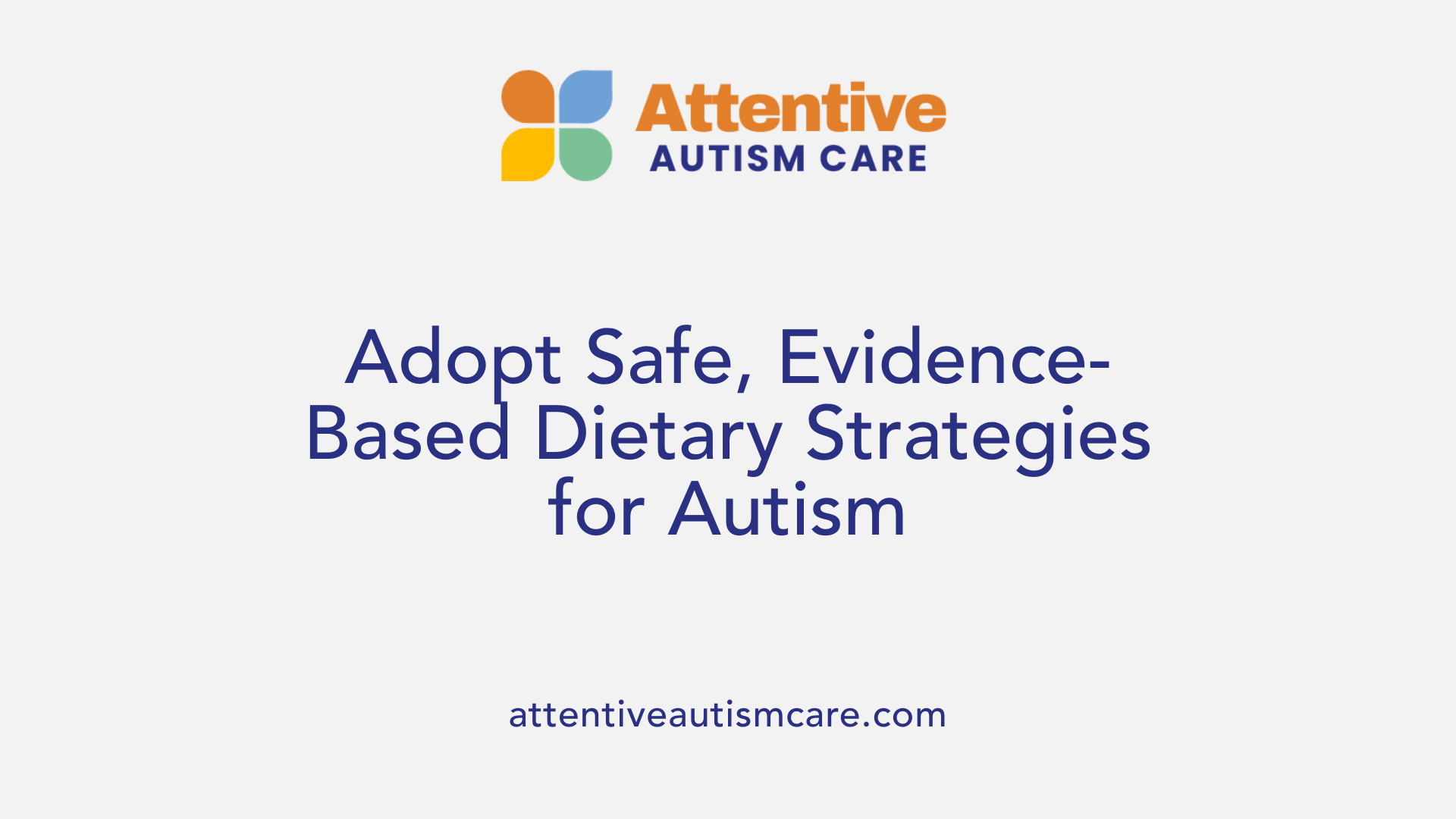
What evidence-based dietary strategies are recommended for autism symptom management?
Research suggests that certain dietary changes may help manage autism symptoms for some children. The most commonly discussed strategies include gluten-free and casein-free (GFCF) diets. Many parents and clinicians observe improvements in behavior and gastrointestinal issues when these proteins are removed from the diet. However, scientific evidence supporting these diets is mixed, and they should be approached with caution.
Supplementing with specific nutrients like vitamins D and B12, omega-3 fatty acids, and compounds such as sulforaphane from broccoli sprouts has shown promise in some clinical trials. These supplements aim to address nutritional deficiencies often seen in children with autism, including low intake of calcium, zinc, and vitamins D and B12.
Another focus is gut health, which appears linked to behavior. Strategies include improving gut microbiota using probiotics, reducing inflammation, and supporting intestinal integrity. Such approaches are believed to alleviate gastrointestinal symptoms that often coincide with behavioral challenges.
It is essential to emphasize that all dietary interventions should be supervised by healthcare professionals. This ensures nutritional adequacy and minimizes risks of deficiencies or adverse effects. Personalized plans tailored to individual responses, sensitivities, and dietary needs are crucial.
Special diets like the ketogenic, the Feingold, or the Specific Carbohydrate Diet (SCD) are also explored by some families. While responses vary, these interventions can be beneficial when carefully monitored by dietitians or medical teams.
Monitoring nutritional adequacy
Ensuring children receive all necessary nutrients is vital, especially when modifying diets. Nutritional monitoring may include regular blood tests and dietary assessments to prevent deficiencies in essential vitamins and minerals.
Supervision by healthcare professionals
Before initiating any significant dietary change, consulting with a registered dietitian or physician is recommended. Professional guidance helps avoid potential nutritional gaps while maximizing possible benefits.
Personalization of dietary plans based on individual response
Each child with autism responds differently to dietary adjustments. Personalizing plans involves considering individual sensitivities, preferences, and responses to specific foods or supplements. Ongoing assessment allows for adjustments to optimize both health and behavioral outcomes.
| Strategy | Description | Evidence & Considerations |
|---|---|---|
| Gluten-Free and Casein-Free Diet | Removing wheat and dairy proteins | Popular but mixed evidence; supervised to prevent deficiencies |
| Vitamin and Mineral Supplementation | Using targeted supplements like vitamin D3 and zinc | May improve metabolic and behavioral functions |
| Gut Microbiome Support | Using probiotics and dietary fiber | Potential to reduce GI symptoms and improve mood |
| Specialized Diets (Ketogenic, SCD) | Restrictive, therapeutic diets | Some evidence, requires expert supervision |
| Omega-3 Fatty Acids | Incorporating fish, seeds, oils | May reduce hyperactivity and support cognition |
More about evidence-based approaches
The evolving research underscores an important message: While dietary strategies can offer benefits, they are not cures for autism. Consistent monitoring, professional supervision, and personalized planning are essential components of a safe and effective dietary intervention.
The Path Forward in Autism Nutrition
While dietary modifications can support symptom management and improve quality of life for individuals with autism, they are not cures. A holistic approach involving healthcare professionals, including dietitians, is essential to ensure nutritional balance, address sensory and behavioral challenges, and tailor interventions to each individual's needs. Ongoing research continues to shed light on the complex interactions between diet, gut health, and neurological function, promising more precise and effective nutritional strategies in the future. Education and collaboration among families, clinicians, and researchers remain vital in translating emerging evidence into practical, safe, and impactful dietary practices.
References
- Nutrition and autism
- Effects of Diet, Nutrition, and Exercise in Children With ...
- Nutrition and Autism Spectrum Disorder: Between False ...
- Autism and Nutrition: The Connection Between Diet and ...
- Autism and diet - BDA - British Dietetic Association
- Diet for Autism | Food for the Brain Foundation
- the relative contribution of autism-linked traits | Nutrition Journal
- Autism and Diet: How Does Nutrition Affect Health?




































































































